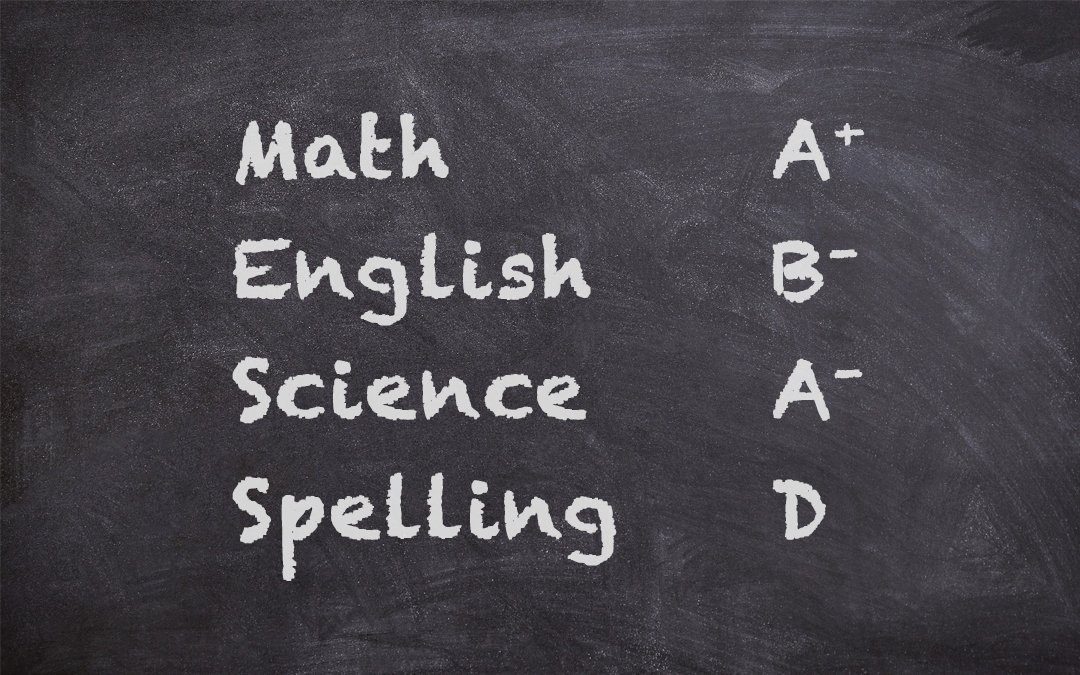The day the report card comes home can bring a mix of emotions for everyone, with a range of everything from celebration and pride, to stress and disappointment. Unfortunately, there can also be a lot of misunderstanding about what exactly the report card is saying.
When it comes to staying up to date on your child’s progress in school, and knowing how to best support them, the report card can provide a lot of insight – and it can also lead to a lot of confusion. For example, reading the comment, “Jimmy demonstrates an increased ability to subitize, with support,” doesn’t explain much unless you know what subitizing is (recognizing a quantity value without having to count, as with on dice, a ten frame, etc.), how Jimmy needs support to do it, and whether it’s considered “at grade-level” to require support or not. The language definitely isn’t what you likely use in your day-to-day conversations. On top of that, report cards can become even more confusing if you move between provinces or states, or even districts, because everything from the report card template, to the grading system, to what is being commented on is specific to that place. So if it feels like it takes an entire team of experts to unearth the mysteries of your child’s report card, that’s because it kind of does – and that team is you, your child, and their teacher.
Here are the main things you need to know:
1) The report card is a legal document that requires teachers to comment on a child’s progress in relation to specific learning outcomes that are specified by their state/province, at that grade level. What is being assessed is not randomly decided by the teacher, they are following what their state/province requires of them and their students.
2) Read the comments, don’t just focus on the grade. The comments explain the grade they were given by stating what your child is doing well, what their challenges are, and what the suggested next steps may be. If your province or state’s report card does not contain all this information, contact your child’s teacher.
3) Even if your child is doing well, teachers are always looking to where students can grow to and how we can help them continue to improve. Once they’ve met an outcome, there is always the next level of learning objectives to be working on, which means that having things to improve upon does not necessarily mean they are doing badly. So, unless the teacher indicates their concern about your child’s achievement, don’t worry, and if they do express concern know that they are there to work with you and help your child.
4) The extent to which a child must be able to independently complete a task or demonstrate a skill depends on their age, grade level, and the time of year. If the report card says they are able to do it “with support” or “with prompting” and the grade reflects that they are doing well, then it’s okay that they can’t do it totally on their own yet – learning is a process. If the grade shows that they are not doing well, then it means the expectation for that grade level and time of year is that they should be able to complete that task or demonstrate the ability without help and they aren’t there yet. Again, learning is a process so it just means they will need to continue to work on it.
5) There are many skills and outcomes that are repeated from year to year because it takes a lot of practice and exposure to get it, so it’s totally normal to see similar learning objectives mentioned year to year in your child’s report card. You wouldn’t give a hockey player stick handling drills once and then forget about it, and the same goes for practicing or learning academic outcomes such as spelling, sound patterns, fluency, and comprehension skills. In Language Arts, they will always be working on those skills, to various extents, over the years.
6) That being said, some years the academic demand increases significantly in certain subjects, so your child’s report card might not always be consistent year to year. They may go from always struggling in reading to finally having something “click” for them and suddenly doing well, or this might be the year fractions and long division are introduced and suddenly the math grade isn’t as high as it used to be. Read the comment and check in with the teacher to find out what the root of the change is. It might be common for that grade level and it might not be, but they can let you know.
At the end of the day, the biggest resources available for understanding report cards are your child and their teacher. They can tell you what they’ve been working on, how it’s been going, and what you can do to be helpful.
After all, it takes a village.
If you want your child to work on, keep up, or accelerate their reading skills this summer, sign up for our Hoot Summer Program! We have fixed and flexible options available to fit your summer schedule. Click here to learn more! Limited spots available.
